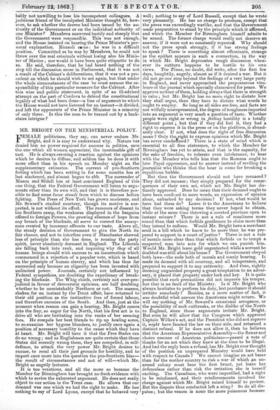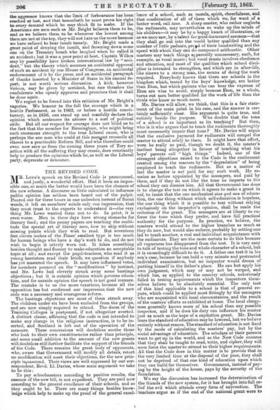MR BRIGHT ON THE MINISTERIAL POLICY.
FEMALE politicians, they say, can never endure Mr. Bright, and it is easy to understand why. Nature has denied him no power required for success in politics, save the one which all women appreciate, the inestimable gift of tact. He is always creating a reaction against the opinions which he desires to diffuse, and seldom has he done it with more effect than in his speech on Monday night on the supplementary estimates. The current of pro-Southern feeling which has been setting in for some months has at last slackened, and almost begun to ebb. The surrender of Mason and Slidell has at least convinced England of this one thing, that the Federal Government will listen to argu- ments other than its own will, and that it is therefore pos- sible to find some locus standi from which to discuss before fighting. The Press of New York has grown moderate, and Mr. Seward's studied courtesy, though its motive is sus- pected, is not without its effect. The rumours of dissent in the Southern camp, the weakness displayed in the bargains offered to foreign Powers, the growing absence of hope from any breach of the blockade, all serve to correct the annoy- ance created by incessant affronts to our taste. Above all, the steady decision of Government to give the North its fair chance, and not to interfere even if Manchester showed less of principle than she has done, is rousing the party spirit, never absolutely dormant in England. The Liberals are falling back into rank, and inquiring why they of all human beings should wish success to an insurrection which commenced in a rejection of a popular vote, which is based on the principle of human slavery, and which has thus far succeeded only because an oligarchy has been invested with unlimited power. Journals, certainly not influenced by Federal sympathies, are doubting the expediency of break- ing the blockade. The Whig chiefs, certainly not over-pre- judiced in favour of democratic opinions, are half doubting whether to be unmistakably Northern or not. The masses, shaken for an instant by the Trent affair, have returned to their old position as the instinctive foes of forced labour, and therefore enemies of the South. And then, just at the moment when reason can gain a hearing, Mr. Bright comes into the fray, so eager for the North, that his first act is to drive all who are hesitating into the ranks of her seeming foes. He compels her best friends to rip up healing sores, to re-examine her bygone blunders, to justify once again a position of necessary hostility to the cause which they have at heart. Mr. Bright will have it that the Free States can do no wrong ; and as Englishmen are quite certain that those States did recently wrong them, they are compelled, in self- defence, to attack the very power Mr. Bright desires to excuse, to recal all their just grounds for hostility, and to import once more into the question the pro-Southern bias— the result of circumstances and not of will—which Mr.
Bright so angrily lectures. • It is too vexatious, and all the more so because the Member for Birmingham has brought no fresh evidence with which to revive the exhausted argument. He does not really object to our action in the Trent case. He allows that our demand was one which we had the right to make. He has nothing to say of Lord Lyons, except that he behaved very well; nothing to say of Lord Russell, except that he wrote very pleasantly. He has no charge to produce, except that the press was exceedingly warlike, and that the Government made preparation to stand by the principle which it affirmed, and which the Member for Birmingham himself admits to be sound. The former charge would really not deserve an answer, if it were not so constantly repeated. Why should not the press speak strongly, if it has strong feelings to speak ? There is something almost effeminate, strange as the epithet appears in such a connection, in the way in which Mr. Bright deprecates rough discussion when- ever its outturn happens to be hostile to his own views. The Times, no doubt, did write, after the first few days, haughtily, angrily, almost as if it desired a war. But it did not go one step beyond the feelings of a very large party in England, and never approached the preposterous viru- lence of the journal which specially clamoured for peace. We approve neither of them, holding always that there is strength in calm ; but Mr. Bright has no more right to dictate how they shall argue, than they have to dictate what words he ought to employ. So long as all aides are free, and facts are not wilfully misrepresented, the degree of roughness imported into an argument is very much a question of taste. Whether people were right or wrong in feeling hostility is a totally different point ;. but that if they did feel it, they had a right to express it in the press or on the platform, is abund- antly clear. If not, what does the right of free discussion mean ? Only the,hright to express opinions which Mr. Bright has never condeffined ? There is a state of mind which is essential to all free statesmen, to which the Member for Birmingham has yet to attain, and that is the capacity, for the sake of freedom, to tolerate even intolerance, to bear with the Member who tells him that the Romans ought to love Papal oppression, and to answer instead of reviling the journalist who thinks that the hour is come for breaking a republican bubble. But then the Government should not have menaced ? They did not menace ; they simply prepared for the conse- quences of their own act, which act Mr. Bright has dis- tinctly approved. Does he mean that their demand ought to have been confined to mere words, an expression of opinion alone, unbacked by any decision? If not, what would he have had them do? Leave it to the Americans to believe that they were asking terms they never hoped to obtain, while at the same time throwing a coveted province open to instant seizure ? There is not a rule of manliness more sound than that which forbids gentlemen to claim more than they intend to enforce. Would Mr. Bright have a merchant send in a bill which he knew to be more than he was pre- pared to support in a court of justice ? There is not a rule of morals more clear than that which forbids us to tempt a suspected man into acts for which we can punish him. Would Mr. Bright leave gold unprotected while a servant he doubted was still about his house? The Government obeyed both laws—the code both of morals and manly bearing. It made its demand with all courtesy, and all temperance, and prepared to support it to any extremity. And then, rightly deeming unguarded property a great temptation to an adver- sary, it placed that property under lock and key. It is quite possible that such precautions did not improve his temper, but that is no fault of the Ministry. Is it Mr. Bright who always hesitates to perform his duty, lest perchance it should irritate somebody ? Besides, as a mere matter of fact, it was doubtful what answer the Americans might return. We will say nothing of Mr. Seward's occasional arrogance, or the possibility of mob outbreaks, or the dislike of the North to England, since those arguments irritate Mr. Bright. But even he will allow that the Congress which approved Captain Wilkes's act, and the President who did not reprove it, might have fancied the law on their side, and returned a distinct refusal. If he does not allow it, then he believes that the American Representative Assembly—the flower and choice essence of American politicians—passed a vote of thanks for an act which they knew at the time to be illegal. And bad the reply been a refusal, has Mr. Bright ever thought of the position an unprepared Ministry would have held with respect to Canada? We cannot imagine an act baser than for the mother country to risk a war of which gin un- armed colony must bear the first brunt, yet leave her defenceless rather than risk the irritation she is herself exciting. The Canadians, who were imperilled, had a right to be reinforced, and their reinforcements involved the charge against which Mr. Bright raised himself to protest. t.
But the dispute thus conducted left a sting ? So do all dis- putes; but the venom is none the more poisonous because the aggressor knows that the limit of forbearance has been reached at last, and that henceforth he must prove his right to every demand which he may think fit to make. If the Americans are men such as Mr. Bright believes them to be, and as we believe them to be whenever the lowest among them are not at the top, they will not hate us the more because we have refused to bear insult tamely. Mr. Bright made a great point of denying the insult, and frowning down some one on the Treasury bench who laughed when he called it an accident; but it was a poor point at best. Captain Wilkes may by possibility have broken international law by "acci- dent," but the theory which assumes an accidental approval of such an accident by one House of Congress, an accidental endorsement of it by the press, and an accidental paragraph of thanks inserted by a Minister of State in his annual re- port, is not worth serious discussion. A kick, however vicious, may be given by accident, but one thrashes the confederate who openly approves and promises that it shall be done again. We regret to be forced into this criticism of Mr. Bright's vagaries. We honour to the full the courage which in a hostile Parliament, as in 1862, or before a hostile consti- tuency, as in 1856, can stand up and manfully declare the opinion which sentences its utterer to a sort of political exile. But all our respect for courage does not blind us to the fact that the member for Birmingham, who might bring such enormous strength to the true Liberal cause, who is perhaps the one man who could at this morrent reconcile all classes to a practicable Reform Bill, and who therefore could even now save us from the coming three years of Tory re- action with all the suffering they may create, does constantly help to produce the opinions which he, as well as the Liberal party, deprecate or denounce.































 Previous page
Previous page